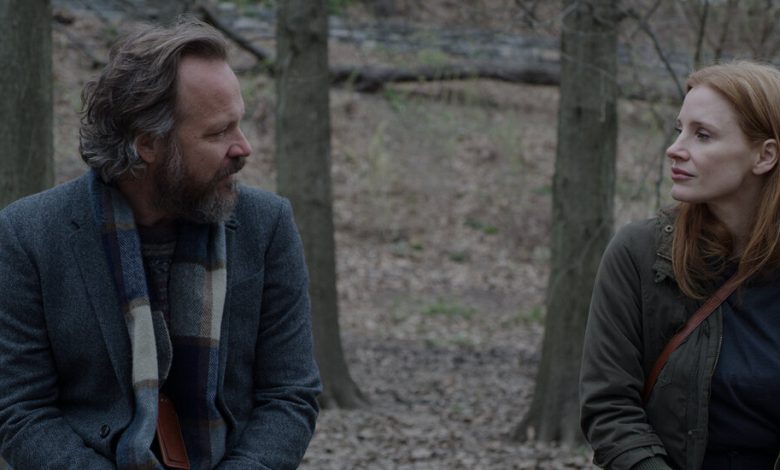‘Memory’ Review: A Trauma Plot

In “Memory,” a woman haunted by her past meets a man who’s scarcely holding onto his. That’s the setup in the writer-director Michel Franco’s contrived drama with Jessica Chastain and Peter Sarsgaard, whose work in this artsified slab of exploitation cinema is strong enough that you wish their characters would run off to an entirely different movie.
Chastain plays Sylvia, a recovering alcoholic with a day job caring for disabled adults. She and her sweet teenage daughter, Anna (Brooke Timber), have a spacious, sunlit apartment in an industrial-looking building in Sunset Park, Brooklyn. There’s a tire store next door and multiple locks on their apartment door. Each time Sylvia returns home, she fastens the locks and arms the alarm with great deliberation, a ritual that Franco repeatedly presents. It’s a habit that like Sylvia’s wariness and physical reserve — she doesn’t readily make eye contact and tends to cross her arms in front of her chest — underscores her guardedness.
One night, Sylvia and her sister, Olivia (the always welcome Merritt Wever), attend a high-school reunion. There, a visibly uncomfortable Sylvia withdraws into herself, but when a man — Sarsgaard as Saul — approaches her, she splits for reasons that become torturously clear only later. He follows her onto the subway and all the way to her building’s front door, where he stays even when it begins pouring. The next morning, Sylvia finds him shivering and near-incoherent, sitting in a spare tire on the ground. It turns out that Saul has early-onset dementia and lives in his handsome brownstone, watched over by his no-nonsense brother, Isaac (Josh Charles), whose daughter, Sara (Elsie Fisher), comes and goes.
Soon, Sylvia begins taking care of Saul part-time, a job that turns intimate and then unsurprisingly romantic. The relationship doesn’t cohere dramatically, alas, despite the demonstrative tenderness and commitment that the actors bring to it, and the story’s multiple gaps in logic don’t help. It doesn’t make sense that Isaac, who comes off as a fairly self-important professional, doesn’t have any hired help when Sylvia arrives, especially given the family’s obvious economic resources. (I also seem to have missed the scene when he runs a background check on her.) Like Olivia’s husband and kids, a collection of bland types, Isaac mainly serves as a convenient bourgeois prop that Franco can swing at before blowing it up.
Chastain reliably holds the screen even if her performance often feels overly studied rather than lived in, never more so than in her scenes with Sarsgaard, whose delicate, quicksilver expressiveness appreciably deepens both the movie and its stakes. You don’t always believe in Sylvia and Saul as a couple, but Sarsgaard makes you want to. Certainly the two actors give you a reason to watch this movie, which grows all the more complicated and then tauntingly nutso with the entrance of Sylvia’s estranged mother, Samantha (a vivid Jessica Harper as monstrous maternity incarnate). Samantha, who’s remained in contact with Olivia, is thinking of moving nearby, mostly, it seems, so that Franco can destroy Sylvia’s fragile equanimity.
Franco, whose movies include “After Lucia” and “Sundown,” likes to approach his anguish-laden stories (of rape, abuse, murder) with relatively calculated coolness and art film-lite trappings. It’s obvious from the get-go that Sylvia is deeply troubled, probably by her past. Although Franco scatters hints here and there, he also withholds the worst until a late, awkwardly staged meltdown filled with tears, shouting and ugly, unsurprising revelations. If until that moment, Sylvia has not yet fully addressed her pain — including in any of the A.A. meetings she attends — it’s not because she’s especially tight-lipped. Rather, Franco saves her big reveal for maximum narrative oomph: It’s the trauma plot’s equivalent of the money shot.
Memory
Rated R for male nudity. Running time: 1 hour 40 minutes. In theaters.
